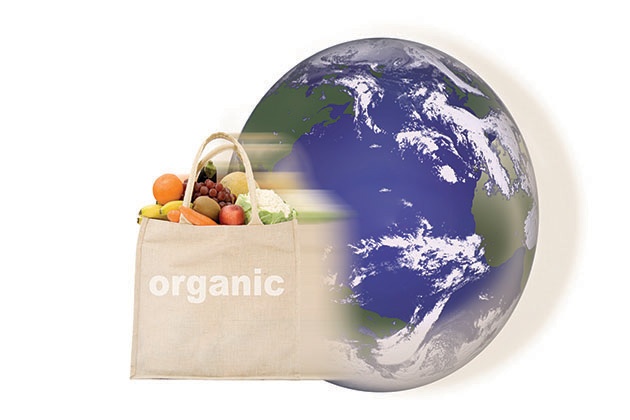Study shows growing food organically has higher impact on podnebí because of more land use
organický food has become very popular in the last decade as consumers are becoming more aware and health and quality conscious. organický food is produced naturally from ekologické zemědělství which aims to increase the naturalness of food by minimizing chemical interference when producing it. So, organický food does not include any pesticides, synthetic fertilizers or other artificial additives. The produce of meat, eggs and other products from animals, is termed organický if animals were not subjected to any antibiotics or growth hormone supplements. Every food item produced organically is also more expensive than conventional food because without use of chemicals or additives, it takes longer time to produce organický food and thus requires more resources in terms of land, time etc. The demand for Biopotraviny is certainly higher and rapidly growing compared to the supply which is further contributing to high prices of organický jídlo.
Conventional farming vs organický zemědělství
Výzkumníci z Chalmers University of Technology ve Švédsku vyvinuli novou metodologii pro analýzu dopadu ekologické zemědělství on podnebí via the factor of land-use by comparing conventional food production in agriculture with organický production. Their study showed that producing organický food contributed to higher emissions into the životní prostředí, Například, organický peas farmed in Sweden had almost 50 percent higher impact on podnebí while for other foods like Swedish winter wheat this number was as high as 70 percent. This is attributed to two reasons; first, to the more land required for organický farming and second, since fertilizers are not used in organický farming the yields per hectare is considerably reduced. For every single food product, be it organic meat or dairy product the land required is much more for organic production compared to conventional zemědělství. This greater land use automatically leads to higher carbon dioxide (CO2) emissions because for every land which needs to be cultivated, forests are converted by cutting trees leading to deforestation. Deforestation accounts for 15 percent of total greenhouse emissions on our planeta. Simply put, felling of trees is doing an irreversible damage to the environment and to the ecosystem (flora and fauna).
'Cena uhlíkové příležitosti'
Ve své studii publikované v příroda výzkumníci poprvé použili novou metriku nazvanou „Carbon chance Cost“, která hodnotí uhlíkovou stopu prostřednictvím účinků vyššího využívání půdy a toho, jak přispěla k emisím CO2 z odlesňování. Emise CO2 byly tedy započítány proti celkovému výnosu potravin, ve kterém poměr biopotravin zcela jistě zaostával. Bylo zohledněno množství uhlíku uloženého v lesích a v důsledku odlesňování se CO2 uvolňuje do atmosféry. Překvapivě nebyl faktor využití půdy a jeho vliv na emise CO2 nikdy předtím analyzován v žádné předchozí studii, možná kvůli nedostatku přímých a snadno použitelných metod. Nová metrika „Cena příležitosti k uhlíku“ umožňuje jednoduché, ale podrobné srovnání. Celkovou produkci v zemi a celkové výnosy na hektar pro statistiku ekologického a konvenčního zemědělství poskytla Švédská rada pro zemědělství.
organický zemědělství never uses artificial fertilizers as the crops are nourished and nurtured through nutrients naturally present in the soil and if needed only natural pesticides are used. The flipside is that valuable resources like land, water and energy consumed are much higher in organic farming and its relevant to understand how it can be made sustainable over a period of time. According to this study consuming organically produced beans or chicken is better for the podnebí then let’s say conventionally produced beef. And eating pork, chicken, fish or eggs will have lower impact on environment than say eating beef or lamb.
However, this study does have limitations – as it was restricted to a few crops and in only one region of a country. So, the recommendation is not to stop consuming organic food altogether. But it is clear, where impact on podnebí is concerned, organic food fares worse than conventional food because of the zemědělství methods. There is still lack of substantial scientific evidence to show that organic food is more health friendly or even environment friendly than conventionally farmed food. So even if one assumes organic food is better for people, it may not be so good for the planeta! More data is certainly needed to arrive to generalized conclusions. The analysis in this study could also be correlated to biofuels as their production also needs larger land area compared to conventional fuels.
***
{Původní výzkumný dokument si můžete přečíst kliknutím na odkaz DOI uvedený níže v seznamu citovaných zdrojů}
Zdroje)
Searchinger TD et al. 2018. Assessing the efficiency of changes in land use for mitigating podnebí změnit. Příroda. 564 (7735).
http://dx.doi.org/10.1038/s41586-018-0757-z






































